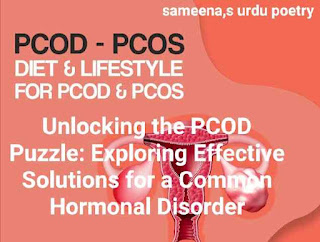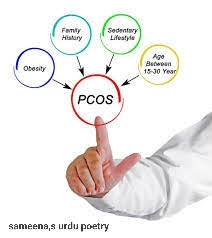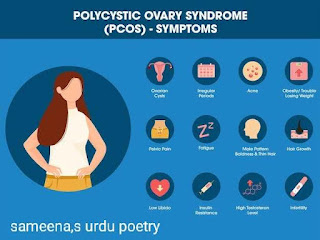Unlocking the PCOD Puzzle: Exploring Effective Solutions for a Common Hormonal Disorder
Understanding the causes of PCOD
Common symptoms of PCOD
Diagnosing PCOD: Tests and examinations
Lifestyle changes for managing PCOD
The role of diet in PCOD management
Natural remedies and supplements for PCOD
Medical treatments for PCOD
Support groups and resources for PCOD
Conclusion: Empowering women with PCOD to take control of their health
pcod solution
pcod problem solution
pcod problem solution food
pcod problem solution exercise
what is pcod and pcos problem
pcos hair fall solution
What is PCOD?
PCOD is a condition where hormonal imbalances lead to the development of small cysts on the ovaries. This disrupts the regular menstrual cycle and can have various health implications.
Understanding PCOD Symptoms
Irregular Menstrual Cycles
One of the primary indicators of PCOD is irregular menstrual cycles. The absence of regular ovulation affects the release of eggs, impacting fertility.
Hormonal Imbalances
PCOD disrupts the usual balance of hormones, particularly androgens and insulin, leading to various symptoms like acne, excessive hair growth, and weight gain.
Ovulatory Dysfunction
Women with PCOD often experience difficulties in ovulating regularly, contributing to fertility challenges.
Causes of PCOD
Genetic Factors
Genetic predisposition plays a significant role in PCOD development. Understanding family history aids in early detection and intervention.
Insulin Resistance
Insulin resistance is a common factor, linking PCOD with metabolic health. Lifestyle changes can mitigate this risk.
Lifestyle and Diet
Poor lifestyle choices and unhealthy diets can exacerbate PCOD symptoms. A balanced lifestyle and nutritious diet are crucial for management.
Diagnosis and Challenges
Importance of Early Detection
Early diagnosis allows for timely intervention, preventing complications such as diabetes and cardiovascular issues.
Common Misdiagnoses
PCOD often faces misdiagnoses due to overlapping symptoms with other conditions. Proper diagnostic criteria are essential for accurate identification.
Lifestyle Modifications
Healthy Eating Habits
A balanced diet rich in fruits, vegetables, and whole grains positively impacts hormonal balance and aids in weight management.
Regular Exercise
Physical activity helps regulate insulin levels and promotes overall well-being, essential for managing PCOD symptoms.
Stress Management
Stress exacerbates PCOD symptoms. Techniques such as meditation and mindfulness can contribute to better stress management.
Medical Treatments
Hormonal Therapies
Oral contraceptives and hormone-regulating medications help regulate menstrual cycles and control androgen levels.
Fertility Medications
For those trying to conceive, fertility medications stimulate ovulation, increasing the chances of pregnancy.
Surgical Interventions
In severe cases, surgical interventions like ovarian drilling may be considered to manage symptoms.
Natural Remedies
Herbal Supplements
Certain herbs like chasteberry and spearmint may offer relief from PCOD symptoms. However, consultation with a healthcare professional is crucial.
Just daily drink this tea 🍵 it help you solve pcod problem
Acupuncture
Alternative therapies like acupuncture have shown promise in managing hormonal imbalances associated with PCOD.
Yoga and Meditation
Practicing yoga and meditation promotes overall well-being, aiding in stress reduction and hormonal balance.
Impact on Mental Health
Coping with Emotional Challenges
Living with PCOD can be emotionally challenging. Seeking professional support or joining support groups can provide valuable assistance.
Seeking Professional Support
Therapy and counseling can help individuals cope with the emotional toll of PCOD, promoting mental well-being.
PCOD and Fertility
Understanding Fertility Issues
PCOD can significantly impact fertility. Seeking advice from fertility specialists and exploring assisted reproductive technologies are viable options.
Assisted Reproductive Technologies
Technologies like in vitro fertilization (IVF) offer hope to those facing fertility challenges due to PCOD.
Managing PCOD during Pregnancy
Special Considerations
Pregnancy with PCOD requires specialized care. Close monitoring and early intervention ensure a healthy pregnancy.
Preconception Planning
Planning for pregnancy with PCOD involves optimizing health before conception, reducing potential complications.
Supportive Communities
Importance of Support Groups
Connecting with others facing similar challenges through support groups fosters a sense of community and shared experiences.
Online Resources
Numerous online resources provide information, guidance, and emotional support for individuals dealing with PCOD.
Breaking PCOD Myths
Myth: Only Overweight Women Get PCOD
PCOD affects women of all body types. Thin women can also develop PCOD, debunking the myth that it is exclusive to the overweight.
Myth: PCOD is Untreatable
With proper management, lifestyle changes, and medical interventions, PCOD can be effectively treated, improving symptoms and quality of life.
Future Research and Developments
Advancements in PCOD Research
Ongoing research explores new insights into PCOD, paving the way for innovative treatments and improved outcomes.
Potential Breakthroughs
Emerging treatments and therapies show promise in revolutionizing PCOD management, offering hope for better results.
Personal Success Stories
Inspiring Journeys
Real-life stories of individuals overcoming PCOD challenges inspire others, providing a positive outlook on the journey ahead.
I hope you get all details information
Thanks for reading
Pcod personalized diet plan and exercise program just visit my Instagram page Keto3537








.png)

.png)

0 Comments
Plzz leave a comment and any suggestions